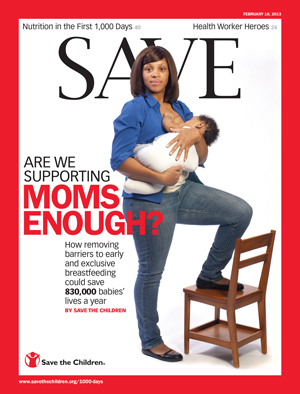The following blog first appeared on The Huffington Post.
_______________________

Last year, Time magazine’s “Are You Mom Enough?” cover practically shouted “Scandal! Women breastfeeding too long!”
The unforgettable image stirred up controversy and I’m sure it sold magazines. But are moms and kids any better off?
Now, imagine funneling all that outrage and punditry into something that really helped mothers and their babies when it came to breastfeeding — especially in the developing world where it can literally save lives.
The real scandal is not breastfeeding late, but that too many moms don’t get the support needed to breastfeed early — or to keep breastfeeding, should they want to.
In our new report, “Superfood for Babies,” Save the Children estimates that 830,000 babies could be saved every year if they were breastfed in the first hour of life. The colostrum, or first milk, provides a powerful shot of antibodies that can stave off deadly disease. And immediate breastfeeding more often leads to exclusive breastfeeding for six months, which can save even more lives.
So why isn’t this happening? Our report identifies four major barriers to breastfeeding:
1) Community and cultural pressures
2) The health worker shortage
3) Lack of maternity legislation
4) Inappropriate marketing of breast-milk substitutes
These factors narrow breastfeeding choices that moms everywhere should be empowered to make — including in the United States. In the developing world, the price is particularly high. A baby dies every 30 seconds for lack of protection breastfeeding provides against malnutrition and deadly disease.
So let’s change the conversation and pose a different question. Are we supporting moms enough? In too many places, the answer is no.
One third of moms around the world give birth without the help of even one skilled health worker. In many communities, beliefs that the colostrum is dirty or that babies should drink (potentially contaminated) water or herbal tea rob them of “nature’s first vaccine.”
Globally, we face a terrible shortage of trained health workers, and new mothers need their support. I

